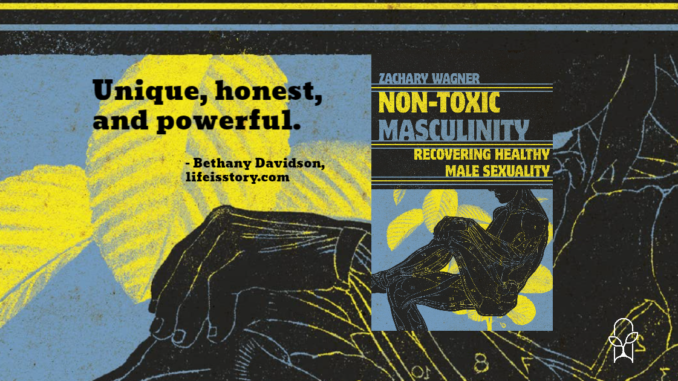
Published by IVP on April 4, 2023
Genres: Non-Fiction, Christian Life, Marriage, Theology, Social Justice
Goodreads

Dismissals such as "boys will be boys" and "not all men" are ingrained in our world. And the purity culture of our youth sold the same excuses with a spiritual spin. Can we break the toxic cycle and recover a healthy identity for men?
In Non-Toxic Masculinity, Zachary Wagner tells men, "If you are in Christ, this is your problem―and you should be part of the solution."
Reflecting on his own coming of age in the purity culture movement and ongoing recovery from sexual shame, Wagner confronts harmful teaching from the American church that has distorted desire, sex, relationships, and responsibility. For those―both men and women―who feel disillusioned and adrift, this book offers a renewed vision for Christian male sexuality founded in empathy and selflessness.
Zachary Wagner covers a dizzying array of issues in this book, unpacking the implications of evangelical purity culture on men’s internal experiences, perception of their sexuality, and relationships with women. Wagner makes space for a range of different experiences, and in addition to sharing his own story, he also shares stories from other men, including some who left Christianity behind because of the harm they experienced within purity culture. Although Wagner holds to a traditional sexual ethic, he never focuses on defending it. Instead, he focuses on explaining why legalistic, unbiblical beliefs about sexuality are harmful, how these beliefs dehumanize both men and women, and how men can heal from harm done to them, repent of harm they may have done to women, and move forward into a healthier understanding of themselves, women, God, and human sexuality.
Thoughtful and Nuanced
Throughout Non-Toxic Masculinity: Recovering Healthy Male Sexuality, Wagner writes about harm done to women and men in purity culture. Sometimes, this involves calling men out for their problems, but he also acknowledges harm done to men through unwise teachings. I appreciated his reflections on the enormous shame and guilt that many Christian boys and men experience simply because they are sexual beings, feeling like horrible monsters just because they find the female form attractive. Wagner also addresses unique issues for gay men and men with low sex drives, who are usually marginalized and unacknowledged in the church. Overall, Wagner shares a very nuanced perspective about male sexuality, and his reflections on the harm and shame associated with pornography will be helpful for many men who feel guilty and unworthy because of this struggle without having any constructive way to view it or pursue effective change.
Wagner addresses a wide variety of ways that purity culture hurts people, sharing others’ stories and writing about his own experiences from adolescence and as an adult married to a survivor of childhood sexual abuse. As he explains from the beginning, his wife gave him her full blessing to write about their sexual struggles within marriage and participated in parts of his writing process that involved her. Their honesty about this challenging topic can help people facing similar struggles, and Wagner writes about how being sensitive to his wife’s needs required him to grow and mature beyond the low expectations that purity culture had for him.
Wagner shares thoughtful, nuanced perspectives on women’s struggles within purity culture and church culture at large, and although he wrote this book primarily for men, he also invites a female readership. Overall, I found this helpful, but I would have preferred less emphasis on women’s issues, since they have been a major part of sexuality discourse for so long and are the center of every conversation and resource about purity culture. Sure, not every man who picks up this book will already know a lot about women’s issues, but many will, and I would have liked a greater focus on harm done to men, and more examples of what this ignored problem can look like.
My Biggest Critique
Most egregiously, even though Wagner writes about the impact of sexual abuse on boys’ development, he only writes about male perpetrators. At one point, when he writes about harmful messaging in churches that portrays women as seductresses, he notes that “few women, and even fewer Christian women, intentionally use their sexuality to harm men.” It is unusual, but it happens, and criminal abuse by women is typically under-reported, due to social stigma against male abuse victims and the confusion that boys may experience about what constitutes sexual abuse. Healing the Wounded Heart by Dan Allender is a helpful resource that acknowledges these realities and shares insight into female-against-male abuse dynamics.
Both men and women need to know and acknowledge that there are female perpetrators too, that there are women who behave in sexually manipulative ways, and that there are girls and women who don’t respect their male partners’ physical boundaries and take advantage of them. I wish this book had acknowledged these realities. This is probably just a blind spot for Wagner, not something he sidestepped to avoid offending women, but it disappointed me that he did not acknowledge additional wounds his male readers might be carrying, even though this book is ostensibly for them. I hope Wagner will reconsider how he addresses this in his future writing and speaking.
Conclusion
Non-Toxic Masculinity: Recovering Healthy Male Sexuality covers a wide range of important topics. People will agree or disagree with the author about different things, but there is something here for anyone who grew up around the kind of messaging around sexuality that Wagner unpacks. Regardless whether someone experienced any significant harm because of purity culture or not, there is something here for them, and although I sometimes wished that Wagner had narrowed this down to a more specific audience to speak with more emphasis on certain things instead of constantly acknowledging arguments for multiple different views, this book is accessible to people who grew up in this kind of environment or love someone who did, regardless of their current beliefs.
